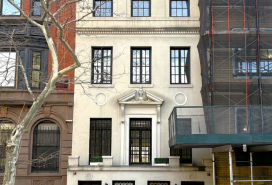- Form a residents' committee and hire a lawyer to review your building's bylaws
- Don't procrastinate: The statute of limitations for negligent design is three years

Getting independent control of the board is an important step in a condo building’s structural and financial health.
iStock
If you recently bought a new condo in New York City, you may be wondering if you can participate on the board—and why the sponsor gets a say in running the building.
For some, getting involved is a response to construction defects. For others, it’s a desire to protect their biggest asset and make sure smart decisions being made about the building's structural and financial health.
For a period of time after construction, the developer of a new condo building will control the board. Although a few owners will be allowed to serve, they will be in the minority. Those board members have the right to look at the building’s records with a few exceptions. For example, if there was a confidential memo related to a lawsuit, they may not get access to this information.
Most developers follow the rules, and as more apartments are sold in the building—typically 50 percent—or after a certain amount of time, provisions in the offering plan and in the governing documents state the sponsor can still elect members but cannot control the board.
[Editor's note: A previous version of this post was published in December 2021. We are presenting it with updated information for October 2023.]
Still, getting independent control of the board is important. “It’s the Gordian knot, it’s what unties everything,” says Bruce Cholst, an attorney who specializes in co-op and condo law at Herrick Feinstein.
A sponsor who controls the board can hide abuses of power. “Not all sponsors are abusive, but the potential for abuse is there, and it does happen," Cholst says, adding that examples can include controlling funds they shouldn't, using building staff to service their apartments, or ignoring faulty construction.
While most sponsors understand that litigation with residents will devalue their apartments and tarnish their reputation, in some cases that doesn’t stop them from being slow to deal with issues.
For example, Bradley (who asked not to use his last name) is the owner of a new condo in a Jackson Heights building that is still controlled by the sponsor and has a cockroach infestation, which isn’t being addressed. Cholst acknowledges that sometimes issues like this “can be illustrative of the problems that arise from protracted sponsor control.”
If there are signs of building defects, it's important to be aware that the statute of limitations for negligent design is three years. That means you need to get independent engineers in to assess the condition of the building within that time frame if you are going to get the sponsor to repair them.
This is especially important if construction defects are "latent," or not immediately visible, Cholst says.
Attorney Philip Tucker, a partner at Herrick Feinstein, points out there’s a six-year statute of limitations for breach of contract, so consulting with an attorney is important.
Following these next steps will help you secure the board's independence.
Create a residents' committee
Unit owners should start considering the transition of the board to independent control as soon as possible.
"Procrastination is a resident's worst enemy," Cholst says. He recommends you start talking to each other right away and form a committee to oversee the changes. Speed is important here because you want the sponsor out "before the three-year window and you need time to investigate and amass the facts," he says.
The clock starts ticking from the date of the first closing in the building and this can be an issue if apartments are slow to sell.
Hire a real estate attorney
An attorney can help facilitate getting control of the building by reading the offering plan and interpreting the condo bylaws, much of which is "concealed behind very thick legalese," Cholst says. These details will determine when owners are entitled to get control of the board. It comes down to how many units have been sold, but Cholst says a sponsor might not volunteer that information.
"The attorney will be able to ask the questions, read the plan, and know when it is feasible to get control. If the sponsor refuses to hand over the reign of powers, it’s the attorney who can threaten suit in order to make it happen or go to the attorney general and ask him to get involved," he says.
Get independent professionals in place
Once you get control of the board, you are then in a position to line up your own professionals rather than those used by the sponsor.
Specifically, you'll need to consider employing an accountant and a managing agent, as well as an architect and engineer. When you have access to all the building records, they will clue you into what’s going on and whether there has been any misconduct, including construction defects. With your team in place, you can analyze the records and begin to prioritize.
Cholst says an important next step is getting an engineer to take a careful look at the building and give an honest assessment.
"In the engineer's report, the sponsor is going to describe [the building] as the Taj Mahal and the tenants are going to assume it is a tenement. The truth lies in between," he says. Engineers are generally conservative (for liability purposes), so Cholst warns you will likely get "a gloomy picture, no matter what."
Pull together a capital plan
The next step is to prepare a capital plan. This is an assessment of the building's structural, mechanical, and financial health. Cholst says you'll be asking the engineer and architect to tell you what needs immediate fixing, like the boiler, and what can wait a few years due to limited funds.
If there are construction issues, you will then have to take on the sponsor, he says. However, as part of the transition, residents should be looking to leverage the knowledge of the sponsor, Tucker says. He points out that contractors and subcontractors may be more responsive to a developer who will give them more work in the future than to residents who won’t. “There is value that the sponsor can bring to that relationship,” he says.
Cholst agrees: “They know the building’s particular idiosyncrasies,” he says, so arbitrarily dismissing the sponsor should not be the board’s first objective.
If necessary, make demands of the sponsor
If you've identified construction defects, and you're within the window of liability, you will be able to make demands of the sponsor. Cholst says some of his clients find out about construction defects too late, and there's very little that can be done. "The sponsor isn’t going to be Santa Claus and voluntarily fix it 99 times out of 100," he says.
Because of these short timeframes to address liabilities, Cholst says, "It is in the sponsor’s interests to remain in control and deny the residents access to all the building records and all the knowledge about building operations as long as possible. Because once they’ve ridden out the statutes of limitation, then they are immune to liability on that."
Be prepared to put the time in
Keep in mind that serving on a board can be very time-consuming. “You have to be prepared to make that commitment, otherwise you will not be an effective board member,” Cholst says.
What's more, the work may be above your comfort level and add to your family and work obligations. On the plus side, a strong independent board adds value to your apartment—which, in New York, is a sizable asset.
You Might Also Like
Sign Up for our Boards & Buildings Newsletter (Coming Soon!)
Thank you for your interest in our newsletter. You have been successfully added to our mailing list and will receive it when it becomes available.





















